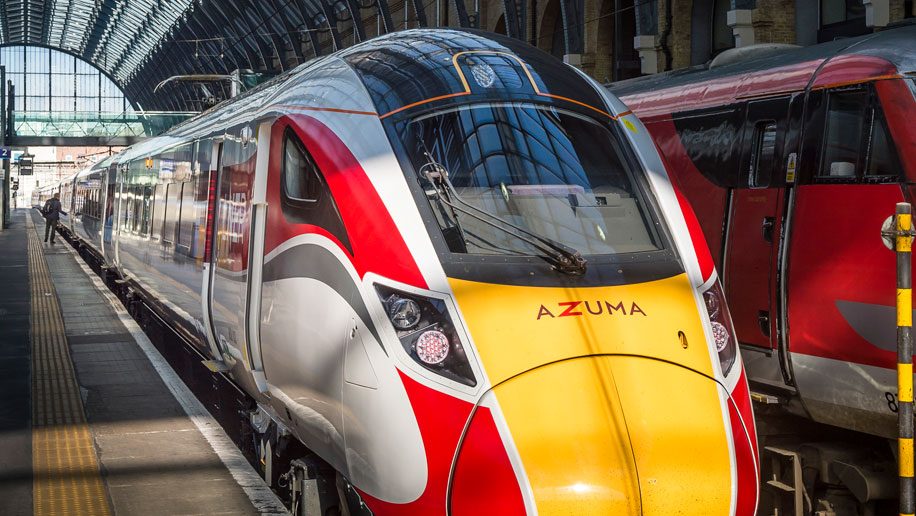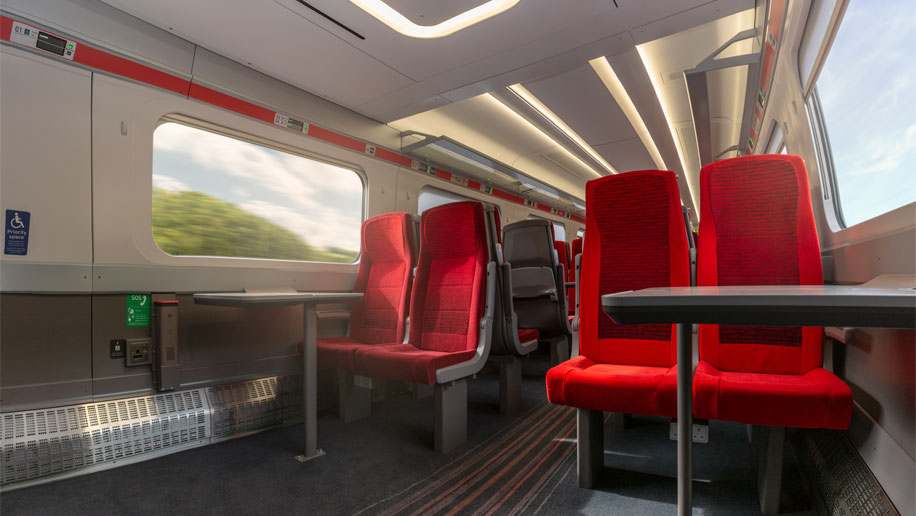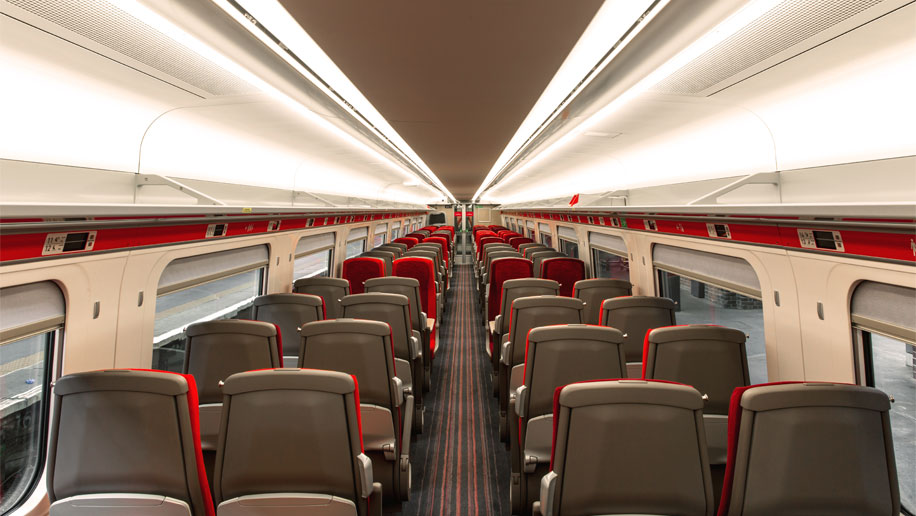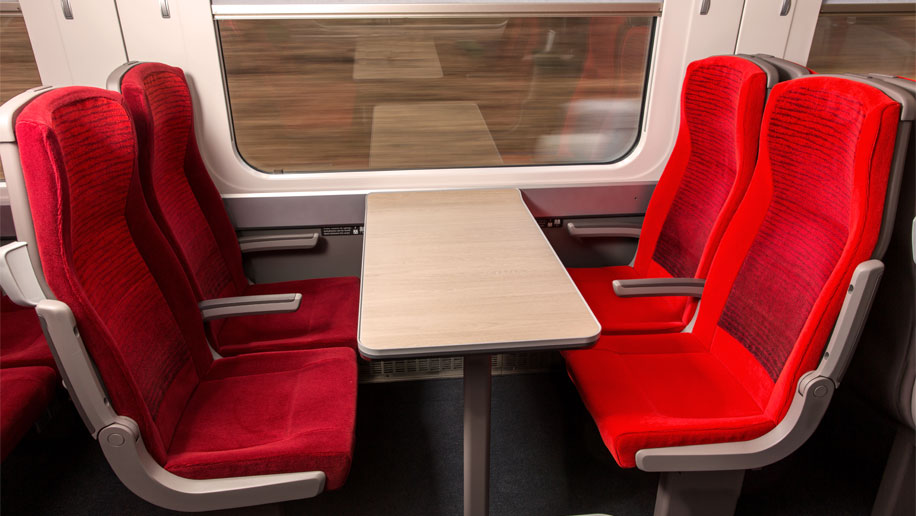
London North Eastern Railway (LNER) has completed the inaugural service of its new fleet of Azuma trains.
The first Azuma-only commercial services will begin this week on London King’s Cross to Leeds and Hull.
A total of 65 trains will replace the existing ageing fleet of 45 trains over the next year, allowing an expansion of services (see below).
Features of the nine-coach trains include a quiet carriage, wifi, extra luggage space, bicycle racks, in-seat power sockets, accessible toilets, bigger digital display screens on the exteriors, pull-down blinds and automatically-locking electric doors.
A walk-up cafe/bar called Let’s Eat is situated in the centre of the train.
First Class passengers get larger tables and reclining seats, USB and plug sockets and a complimentary breakfast or two-course meal service as well as refreshments. See the menu here.

The Azumas also have an additional 100 seats per train, which LNER’s Director of Safety and Operations, Warrick Dent, said could help ease overcrowding.
“It will address the capacity constraint that we’ve historically suffered from,” Dent told Business Traveller on-board today’s preview service to Peterborough.
“It will make a big difference to our customers.”

The trains will allow LNER to add services to destinations including Lincoln (expected September 2019), Harrogate (December 2019) and Bradford (May 2020), according to Dent. The company plans to launch a new timetable in December 2021.
LNER will now add roughly one Azuma train to its network per week, and remove one old model, with the aim to renew the entire fleet by this time next year.
Passengers travelling to Scotland should start seeing the trains by early autumn. LNER runs trains from the UK capital up the East Coast line to the East Midlands, Yorkshire, the North East and Scotland.

The introduction of the new fleet was delayed by several months. LNER took over the East Coast Mainline last summer after Virgin Trains East Coast was stripped of its contract.
The trains were paid for by the UK’s Department for Transportation, which is investing £5.7 billion into a long-standing project called the Intercity Express Programme, intended to improve services between key hubs.
It also funded Great Western Railway’s Hitachi-made trains, though it calls them Intercity Express Trains. Azuma means ‘east’ in Japanese.
Some passengers have criticised the seating on the GWR trains and similar Thameslink trains for being hard and uncomfortable. Operators have said that reduced seat padding is necessary to meet new fire regulations and anti-vandal measures.

At this morning’s inaugural service at King’s Cross, Rail Minister Andrew Jones said it “marked the start of a new age of rail travel in the UK.”
Jones added that building the trains in County Durham and setting up a depot in Doncaster had created hundreds of jobs.
Japan’s Hitachi, the manufacturer, said that 70 per cent of each train’s parts had been sourced from around the County Durham area.
Unlike the current diesel trains, the Azumas can run on both electric and diesel, switching over when they reach an electric overhead line. The line is largely electrified until around Edinburgh.

The Azumas offer faster acceleration than LNER’s current trains, but Warwick Dent told us there would not be immediate scheduling changes in terms of route speeds. That is likely to come with the new timetable in December 2021, when the company can be sure the whole new fleet will be in place.
A key difference for passengers will be efficiency on the route, Dent added.
“I’ve lost count of how many times I’ve spent in our service delivery centre trying to deal with train failures,” he said.
“In March we had a train break down south of Peterborough that resulted in another 22 trains being cancelled. You can imagine the level of disruption that caused.
“For me, having the levels of reliability that a new modern train can bring is fantastic because we should be able to make that a thing of the past. You can’t just nip past a train like you would in your car, but modern trains – we call them ‘trains with a brain’ – have built-in contingencies so it’s very unlikely that they would be stranded. If something fails, you have a legacy built into the system that allows you to overcome that.”
The line proved difficult to operate for Virgin, which reported losses following lower than expected revenue and passenger growth, and high fees.
On the potential of raised ticket costs, Dent commented: “There are no plans to hike prices just because we’ve got a shiny new fleet. The growth of the business will be through the extra capacity we gain from the trains.
“We’re going from 45 trains to 65 trains, and it is the first time we’re seeing a new fleet introduced on the East Coast mainline for over 30 years. It’s long overdue. We will have more trains at our disposal to ensure customers get the service they deserve, in a modern, smooth environment.”










